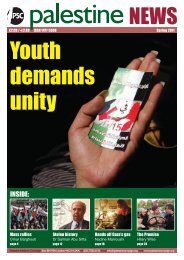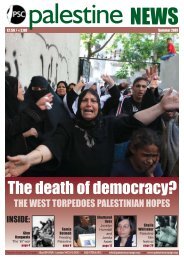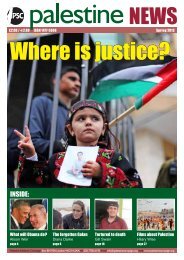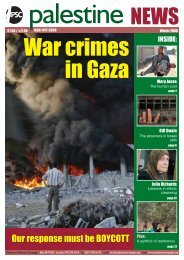World demands - Palestine Solidarity Campaign
World demands - Palestine Solidarity Campaign
World demands - Palestine Solidarity Campaign
You also want an ePaper? Increase the reach of your titles
YUMPU automatically turns print PDFs into web optimized ePapers that Google loves.
Spring 2012 COMMENT & ANALYSISpalestine NEWS 13CARLOS LATUFFof the occupied territory, and thus ignoresthem when reporting on its human rightsrecord. This position has been rejectedcomprehensively by the International Courtof Justice.The Committee then turned to examplesof segregation within Israel itself, notingthe existence of two systems of education,“one in Hebrew and one in Arabic,” separatemunicipalities, discriminatory laws on landissues, discriminatory laws on work andsocial benefits.The Committee called for revocation ofthe Citizenship and Entry into Israel Law andthe withdrawal of the proposed Law for theRegulation of the Bedouin Settlement in theNegev, on the basis of their discriminatoryeffects. Having noted discrimination towardsminorities within Israel’s Jewish population,and against asylum-seekers and refugees,the Committee also criticised the increasein racist and xenophobic attacks againstPalestinians in Israel.While framing these divisions of Israelisociety into Jewish and non-Jewish sectorsas falling within Article 3 of the Convention,(see box) the Committee focused on theconcept of “racial segregation.” TurningDefining the crime ofapartheidThe International Convention forthe Elimination of All Forms ofRacial Discrimination (ICERD)was adopted in 1965. Article 3specifies the obligation of States Partiesto the Convention to oppose apartheid:States Parties particularly condemnracial segregation and apartheid andundertake to prevent, prohibit anderadicate all practices of this nature interritories under their jurisdiction.The International Convention on theSuppression and Punishment of theCrime of Apartheid (1973) confirmed thatnot only were states to be prohibitedfrom committing apartheid but thatto the situationin the OPTs,the Committeeagain drew onArticle 3 but thistime chose toemphasise Article3’s prohibition ofApartheid also.What distinguishesApartheid fromracial segregationis the intent behindthe practice, namelythat Apartheidconstitutes not justracial segregation,but also “inhumanacts committedfor the purposeof establishingand maintainingdomination by one racial group overany other racial group of persons andsystematically oppressing them.”The Committee’s analysis of thesituation in the OPTs led to its expressing“extreme concern” at the implementationby Israel of two entirely different legalsystems and sets of institutions for Jewishsettlers on one hand and Palestinianson the other. Urging Israel to prohibitand eradicate policies and practicesconstituting racial segregation andApartheid, the Committee declared itself tobe “particularly appalled” by the hermeticcharacter of the separation of two groups“who live on the same territory but donot enjoy either equal use of roads andinfrastructure or equal access to basicservices and water resources.”The Committee continued to note thatIsraeli planning and zoning policy in theWest Bank, including East Jerusalem,“seriously breaches a range of fundamentalrights under the Convention,” calledon Israel to eliminate any policy of“demographic balance” from its JerusalemMaster Plan and to rescind the blockadepolicy of Gaza, and urged an end to Israel’sindividuals responsible for such actionwere to be held liable as criminals.Additional Protocol I (1977) ofthe Geneva Conventions of 1949 isapplicable in times of internationalarmed conflict and recognised apartheidas a “grave breach” thus giving rise toindividual criminal responsibility. (art. 85,paragraph 4 (c)).The Rome Statute of the InternationalCriminal Court defines apartheid as acrime against humanity. Article 7.1.hof the Statute provides that, whencommitted as part of a widespread orsystematic attack directed against anycivilian population, with knowledgeof the attack, the crime of apartheidconstitutes a crime against humanity.121 states are signatories to the RomeStatute.practice of Administrative Detention “whichis discriminatory and constitutes arbitrarydetention under international human rightslaw.”While it is important that individualviolations of human rights are notedby the Committee, it is crucial that thesystemic nature of the racist regime hasbeen recognised as one of Apartheid.This assertion legitimises a descriptionthat has been considered highly emotivebecause of the link back to the racistregime in South Africa. Israel’s practiceof Apartheid is different from that seen inSouth Africa yet shares several of the samekey pillars, namely discriminatory legislation,segregation and fragmentation of populationand reliance on a repressive military and“security” policy to suppress dissent orcriticism.This development represents a strikingturn for a provision of international lawthat many had assumed to be an historicalartifact. Having first been reprieved byNGOs and legal activists, the findings ofthe Committee reinforces the fact thatprohibition of Apartheid in international lawremains relevant.At this stage it is necessary thatacademics and lawyers make the effort tobetter understand the nature of the crimeitself and to work towards developingfurther strategies for implementation andenforcement of accountability beforedomestic and international criminaltribunals. While enforcement in international(or national) courts is likely to be a long wayoff, the Committee’s statement providesa key tool for NGOs and activists withwhich to lobby and to use in advocacy andeducation.Apartheid is a concept that is universallyunderstood, recognised and reviled andit is a label that accurately assists indescribing the nature of the occupation.With support from respected bodies suchas the CERD Committee, there is muchgreater leverage in responding to Israel’sapologists and in working to convince thepublic and politicians to take a firm anddetermined stand to support the Palestinianright to self-determination, and to recognisethe necessity of moving beyond thesham process that the Quartet and theinternational community has been happy topeddle for too long.







